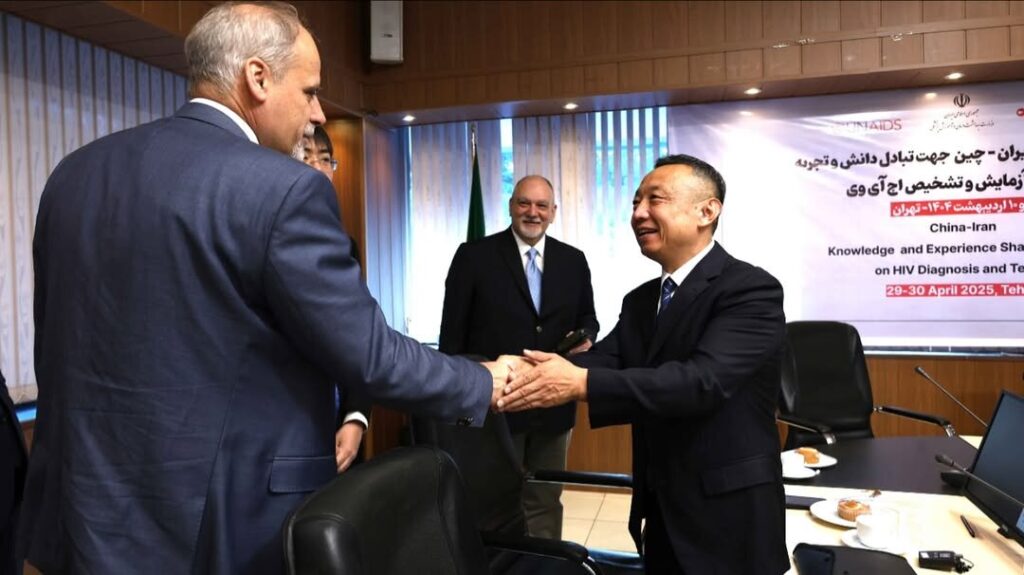TEHRAN – To strengthen the overall resilience of Iran’s national AIDS program and HIV testing capabilities, Iran’s Ministry of Health, China’s Centre for International Economic and Technology Exchange (CICETE), and the Joint United Nations Programme on HIV/AIDS (UNAIDS) (UNAIDS) held meetings to share expertise.
The two-day knowledge and experience sharing meeting was held in Tehran from April 29th to 30th, focusing on the acceleration of Iran’s HIV reaction.
This multi-stakeholder involvement brought together over 30 experts from both countries and UNAIDS to explore the pathway to establish domestic manufacturing capacity for HIV Rapid diagnosis, representing a sustainable pathway to eliminate the HIV testing gap in Iran.
The conference was organized within the framework of a joint agreement signed between Cisete and UNAIDS in April 2024 and was funded by China’s voluntary financial support within the North-South Cooperation Framework.
The agreement, in line with the priorities of Iran’s National AIDS Management Program and China’s Global Development Initiative, combines supply chain, capacity development and knowledge exchange solutions to enhance the initial knowledge of Iran’s key pillars of national HIV response: the global 95-95-95 target. This “first 95” is key to controlling the HIV epidemic in Iran.
The UN’s first 95-95-95 goal of ending the HIV epidemic is for 95% of HIV to know the HIV status by 2025. Therefore, HIV testing is essential to achieving the “first 95”.
The tone of rich debate was set by a statement from the UN resident coordinator of Stephen Pleenor, Iran’s Islamic Republic. Eamonn Murphy, UNAIDS Regional Director for Asia Pacific and Eastern Europe and Central Asia. Xu Peng, assistant supervisor of China’s National STD/AIDS Prevention and Control Centre (NCAIDS); adviser on international affairs for Mohammad Reza Rabal, Iran’s Deputy Minister of Health.
The project not only reveals many of the core values of multilateralism, but also paves the way for further collaboration with Unaids in the fields of Iran, the People’s Republic of China and HIV and health.
During an official trip to China, it falls straight within the framework of biomedical and scientific cooperation between the two countries, announced by Iran’s Minister of Health and Medical Education, Mohammad Reza Zafarkandi.
National HIV Testing Campaign
In November 2024, the Ministry of Health ran a month-long national HIV testing campaign to raise public awareness and identify cases of the disease.
With the theme of “I take the HIV test too,” the campaign was launched on November 10th with two main objectives, the Ministry of Health’s website reported.
First, because early diagnosis is important to allow timely initiation of treatment, the campaign aims to encourage individuals to undergo testing to detect HIV/AIDS infections among major populations.
The second main objective was to provide educational programs in community settings such as city centres and parks to raise public awareness about HIV.
Human immunodeficiency virus is a virus that attacks the body’s immune system. It targets the body’s white blood cells and weakens the immune system. This makes it easier to get sick from illnesses such as tuberculosis, infections, and some cancers. Acquired immunodeficiency syndrome (AIDS) occurs at the most advanced stage of infection.
Despite all the measures taken in the country so far, there are still many challenges to address. One of the main challenges is the lack of HIV detection programs to address spreading disease.
Unaids
The Joint United Nations Programme on HIV/AIDS (UNAIDS) guides and urges the world to achieve a shared vision of zero new HIV infections, zero discrimination, and zero AIDS-related deaths. UNAIDS integrates the efforts of 11 UN organizations. The Health Organization (WHO) and the World Bank are working closely with partners both globally and nationwide to end the AIDS epidemic by 2030 as part of the Sustainable Development Goals.
mt/mg

